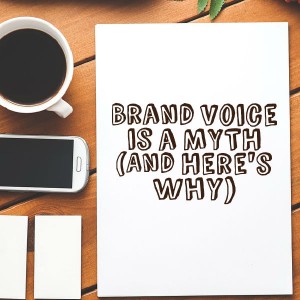 I have come to believe quite firmly that the concept of “brand voice” is a myth.
I have come to believe quite firmly that the concept of “brand voice” is a myth.
Or at least, it’s a myth for about 90% of brands.
Here’s the thing: I’ve been listening to too much Brooks Landon. His discussions on words like “propositions,” “sentences,” and, most importantly, the frustratingly difficult-to-define word “style” have led me to consider more carefully what companies mean when they talk about their so-called “brand voice.”
And I came to the abrupt realization that most people don’t know what they’re talking about.
“Brand voice,” much like “style,” is a phrase so horribly vague that it’s fundamentally useless. It’s not talking about specific types of sentence structure, rhetorical devices, or even grammatical preferences. I’ve come to this conclusion because every conversation I’ve ever had about brand voice boils down to this exchange (perhaps some freelance writers and bloggers can relate to this):
Me: Here’s my copy. It accurately describes your products, imitates the style of the other content on your site, and is grammatically perfect. (You’re welcome for the brilliance that I hath bestowed on you.)
Client: This is really well-written. We like it, but it just doesn’t fit our brand’s voice.
Me: Oh! Let’s revise it to fit your voice. So what is your brand’s voice exactly?
Client: Um.
Me: Do you have an example? Perhaps a piece of writing on your current website that you use as a reference or a set of guidelines?
Client: Our intern scribbled this out…
I’m then given a mission statement, a 200-word piece on the stuff they do and the products they make, and maybe, if I’m lucky, I get a list of words they’d rather not use.
After revising the work to fit those pretty vague parameters, clients will then make changes after the fact.
New writers might find themselves in a wave of hysteria: Did I not put the preposition in the right place? Do they like the phrase “natural” but not “all-natural”? What can I do to make my writing better? Am I just not good at writing? Have I chosen the wrong career path? Am I ugly, fat, and undeserving of love?
If you’re a seasoned writer, you’ve likely come to expect this and are in it for the long haul.
Me: I’ve looked at your changes and am trying to absorb them as I produce content for you. In one piece, you changed X to Y. But then later on, in a different piece for the same site, you changed Y to X.
Client (sobbing): I guess I just don’t know what I want!
Me: I know. It’s going to be OK.
This exchange happens far too frequently.
So Here’s Why This Happens
Brands are just businesses, and business people aren’t all huge grammar nerds or English lit fans like your average writer. They have no real concept of language or the complex functionality of thought-out syntax. They might (might) have some idea of when something works, but they have absolutely no clue why it works or how they can make it work again.
They’ve also been told again and again and again and again that… like… brand voice is… like… important… and stuff. All the cool kids are doing it.
It’s clear that the people giving this advice are right: The companies that have a firm grasp on whatever this “brand voice” thing is seem to swim, while the ones that don’t have strong messaging on social media or in their content seem to be sinking slowly in the search results.
You want to swim, don’t you? Then you’d better get content that fits your brand’s ethereal voice, stat.
So they’re in a rush to figure this out, but no one on their staff is likely an English or marketing major, especially if they’re a small business in a niche area. Or a company might have the opposite problem: They’ve got tons of English and marketing majors who all have conflicting ideas about what they want that perfect voice to be.
We Want to Be Direct and Helpful, But Not Really
Usually, people are dealing with a half-baked concept of what their brand voice should be based on. They adopt a voice not based on their cultivation of a sense of the company’s identity but on what their competitors are doing. Some don’t even look at their competitors but rather at viral content marketing sites like Buzzfeed or Mashable. Their headlines are snappy and cute, and they get a ton of social shares, so brands think they should adopt a voice like that.
Then they attempt to master that click-worthy voice without realizing that they’ve made their brand sound like a 13-year-old girl telling you about how Brad totally talked to her. (Guys, you won’t believe what just happened! This will SHOCK you! His amazing speech took my breath away!)
That’s not only a failure of understanding of how those major content producers work (sourcing and paying for only the best content, spending huge sums on promotion, and earning that money back with things like native advertising), but it’s a failure to understand themselves. This leads to a loss in profit because they are out of touch with their own audience, the people they’re trying to market to.
People like Mashable because it brings you interesting, fun information that you might not have found yourself. Buzzfeed is direct, abrupt, snappy, and, most importantly, helpful, providing detailed information quickly. But people like brands because they give them cool services or products.
Think about your own experience online. When you’re sucked into a curiosity-gap, click-bait headline and then find nothing substantive or interesting, you’ll leave quickly. That bounce will have a direct negative effect on your site. You’ll have actually done a worse job overall than if you had had a boring, dry headline.
In essence, a bad brand voice will attempt to imitate either other major brands or other major content producers but offer none of the substance that’s associated with either.
What Should a Writer, Blogger, or Content Marketer Do?
Pinning down a brand’s voice is hard work for a writer. But when a brand is suffering with the knowledge that they should have a brand voice but have no idea what that means or how to attain one, it’s impossible.
In that case, the writer must realize what’s really going on. The choice then is to stick it out with the client’s finicky, sporadic, haphazard edits in the hopes that they arrive at their brand voice eventually, abandon or fire the client entirely, or hand-hold them through the process of creating something akin to a voice.
How Can We Find a Voice?
I’ve listed some prompting questions one can ask to start thinking of these aloof, value-less terms of “style” and “brand voice” in a more concrete way:
- Who is your audience? Do you have exact demographics? If you had to visualize who a writer should be talking to, what would they look like? (Tone)
- If you had to personify your company as one person, what would that person be like? How old is he or she? What sort of words do they use? Do they spend the weekends working or partying? Who do they hang out with? (Voice)
- Do you like or dislike the passive voice, leading questions, metaphors, or sentence fragments? (Rhetoric)
- Do you want me to state things as directly as possible, with short, clear sentences (like Hemingway)? Are longer sentences also appropriate? (Syntax)
- What sort of vocabulary should be used or avoided? Are there specific industry terms to use outside of keywords? Do you like business jargon? How about slang? (Diction)
- Why am I telling the audience the information I’m presenting, and why do you think they’d be interested? (Theme)
- Does the tone, voice, or theme vary per piece, article, or page that I’m writing for you? (Project Scope)
After either you or the client come to some sort of conclusion on these complex questions, you have something that might be called a “style” or “brand voice.” These might lead to some complicated answers, but at least we can start the wheels turning in the right direction.
“Brand voice” is usually, in my experience, dictated by a business’s desire to communicate more effectively.
Effective communication takes good writing.
Good writing requires knowledge of many aspects of language (tone, style, grammar, rhetoric, and so forth) that don’t roll up into one tightly focused package quite as easily as some marketers have led us to believe, a package one can quickly refer to as “brand voice.”
Good writing should have a good brand voice, and a good brand voice requires good writing.
But brands don’t always know what good writing really is.
It’s an odd logic loop to be stuck in.
